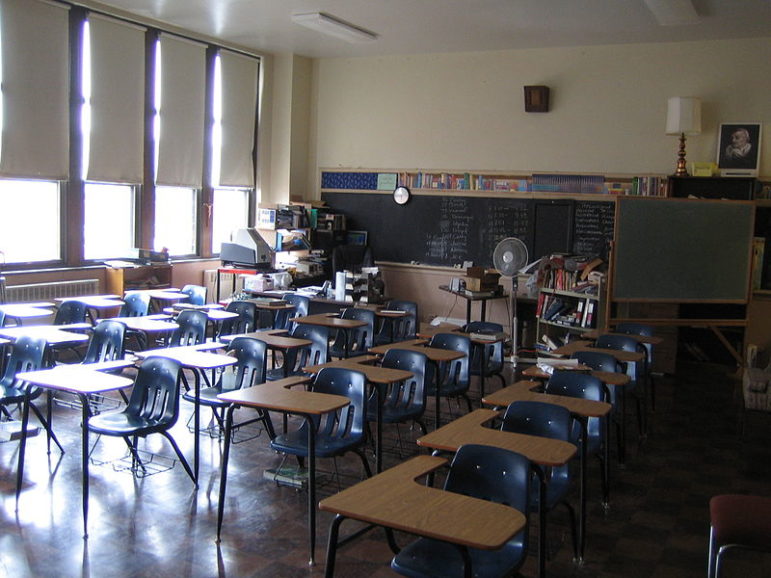
Through no choice of its own, Detroit has become the living laboratory where the key elements of “educational reform” get tried out. Twenty-five years ago, Detroit Public Schools, like many urban school districts, faced serious problems that it appeared unable to solve. Its students were not learning and the public school district was deeply in debt. Something needed to be done to prevent the district from total failure.
The depth of the problem proved to be a perfect opening for market-based “reformers” who saw the solution in radically changing the way we provide public schooling. They put forward a vision for improvement driven by two core principles. To improve the schools’ educational effectiveness, it was necessary to create an educational marketplace that allowed parents to choose the schools they believed best for their children. Families would self-select schools that were more effective, resulting in failing schools being driven out of business. Second, strong, businesslike management would cure the district’s economic problems. Reformers saw this approach as one that would give all children, rich and poor, equal opportunity.
Allie Gross, in her recent article for Vice, tracked Detroit’s experiences since the experiment began in 1993, when the state of Michigan stepped in to cure Detroit’s ailing school system. As Gary Naeyaert, executive director of the Great Lakes Education Project, told Vice, “The goal of charter public schools was to provide choice and options for students and parents trapped in failing traditional public schools who didn’t have the means to move to the suburbs or pay private school tuition. We’ve always had school choice for rich people, and charter schools provided choice for everyone else.”
To give market forces the strength reformers felt they needed, the state’s funding formula was changed to allow funding to directly follow the child. According to Michigan’s governor at the time, John Engler, “The schools that deliver will succeed. The schools that don’t will not.”
Market forces have been successful, at least, in bringing new charter schools into Detroit. Last school year, for the first time, more than half of Detroit’s 100,000 school-aged children attended charters operated independently from a central Detroit school authority. But, as reported by CNS News, the increasing competitive marketplace has not created more excellent schools or improved outcomes for their students:
In 2015, 21 large urban school districts participated in the NAEP tests in reading and mathematics as part of what the Department of Education calls its Trial Urban District Assessment (TUDA). Among these 21 districts, the Detroit Public Schools had the smallest percentages of eighth graders scoring proficient or better in reading and math.
Sign up for our free newsletters
Subscribe to NPQ's newsletters to have our top stories delivered directly to your inbox.
By signing up, you agree to our privacy policy and terms of use, and to receive messages from NPQ and our partners.
To resolve Detroit’s fiscal problems, state-appointed managers were given the power to control expenses and manage the public schools. Despite years of cost cutting, “by July 2015, the district’s general fund deficit was close to $216 million and the net deficit was a yelp-inducing $1.6 billion.” With money following each child to their chosen public school (whether charter or traditional) and no common management authority for public education in Detroit, the public school district has been unable to deal with its fixed costs under the weight of hundreds of millions of dollars of school funding being diverted to the charter sector.
A new state plan to keep Detroit schools from bankruptcy continues to see strong management as the solution: “Starting this year,” according to Gross, “the district could hire uncertified teachers, penalize striking employees and outsource academic roles, like the superintendent position, to surrounding districts.” Deeper, systemic changes were not part of the plan.
If the experiment is truly about saving public education, Peter Hammer, the director of the Damon Keith Center for Civil Rights at Wayne State’s law school, sees it as doomed to failure:
Trying to run a traditional model, where schools are a public good and require a certain amount of public support and public resources, in parallel with a charter system is a death by a thousand cuts. It’s a way that will guarantee the destruction of the traditional public schools but not place anything effective as an alternative.
But, at least in Michigan, this lack of success has not led to a rethinking of the basic strategy. While the economics remain disastrous and the educational results still poor, those in charge don’t consider the strategy itself flawed.
Detroit’s experience is important for more than just its students and citizens. These same strategies fueled school reform efforts in the George W. Bush and Obama years, and we can expect the incoming Trump administration to support their expansion. Incoming Secretary of Education Betsy DeVos was a major force behind the Detroit experiment, and she strongly supports converting traditional public schools into fully market-driven entities.
If the Detroit experiment were really about educating children, the poor results would surely prompt a look into what other forces, like poverty, are affecting outcomes. Instead, the goal may really be to end public education as a service of effective government and turn it into another product to be bought. In that light, Detroit is a success story: More than half of its schools are now privately operated, many by for-profit corporations. The remaining traditional public schools are in failing health, just awaiting, as in Detroit, the clock to run out before they too become publicly chartered private schools supported by public monies.—Martin Levine













